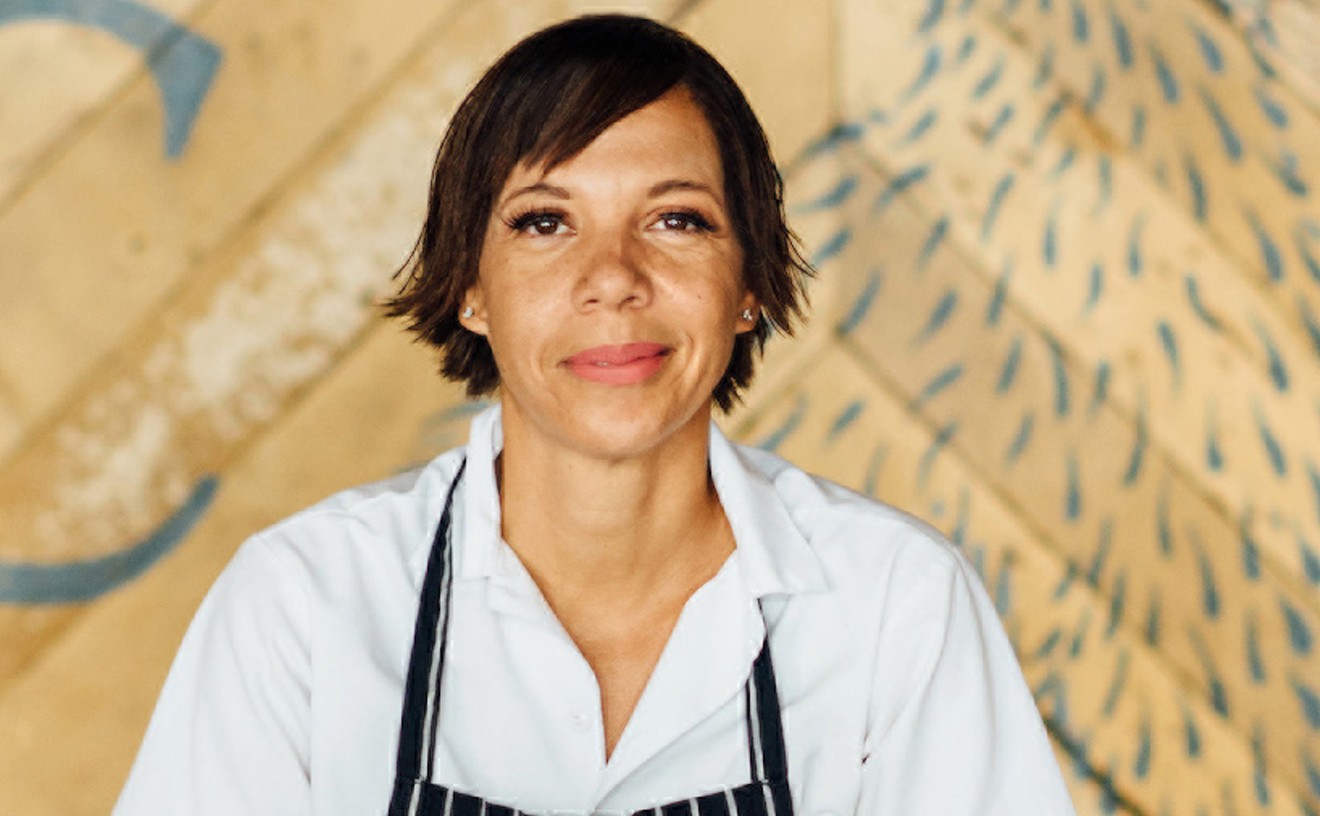Faded pictures of Cuban sandwiches with pressed ham and pork ooze a taxicab-yellow mustard flash on signs that line the bustling avenues of Little Havana. Follow them and soon you're parked, waiting for one at a ventanilla where an espresso machine hisses in the background.
Though this sandwich has for decades been a Cuban icon rivaled by only coffee and cigars, the debate still rages over where it originated. Was it in the island's cigar factories? Or maybe Miami, home of El Exilio? What about Tampa, where Cubans began migrating more than a century ago? Along with pork and cheese, Tampa's sandwiches employ salami or mortadella, courtesy of Italian immigrants in Ybor City long ago.
Miami's Cuban sandwich may have begun in the hands of Raúl Galindo, who in 1974 opened the Latin American Cafeteria on Coral Way at SW 29th Avenue. The small shop quickly became the exile community's spiritual home and a political forum. Sandwich makers plied their trade among piles of sandy-hued Cuban bread and hulking hams dangling from the ceiling. Galindo eventually lost his empire and fortune to divorces, lawsuits, and hurricanes. In the ensuing years, dozens of cafeterias bearing the name "Latin American" sprouted across Miami.
Today, Luis Galindo's Latin American Cafeteria & Restaurant, which is named for Raúl's brother and located at SW Eighth Street and Red Road, makes among the area's best cubanos. These days it's owned by Elias G. Elias, a Lebanese-Syrian man raised in Cuba.
At lunch, businessmen and little old ladies perch on black stools surrounding a U-shaped bar in a rust-colored room that concentrates all attention on a sandwich-making station surrounded by hanging Luter's Smithfield hams. The work is done out in the open rather than hidden in the kitchen. Aproned cooks continuously butter smoking griddles that press countless sandwiches into submission. The perfect press crisps the bread's crust, slightly warms the interior, and compresses the whole thing without flattening it into a cracker.
Between the two halves are mounds of sweet pink ham and layer after layer of salty, fatty pork. The pickles are almost embedded in melted Swiss cheese slices that refuse to let go, even after the sandwich is quartered, plated, and set steaming before customers.
"Luis sold my grandfather the name and showed us how to do everything the way he did it," says Elias' granddaughter Melissa, whose father, Alberto, helms the restaurant.
But now, those behind Little Bread Cuban Sandwich Company and Miami Smokers Urban Smokehouse have applied their own culinary sensibilities and techniques to the icon. They offer smart, long-overdue versions of the cubano that honor the sandwich's role as a hearty meal and means of survival for the countless exiles who struggled to rebuild a life in Miami.
"When our parents got here, they came to make a better life," Little Bread chef and owner Alberto Cabrera says. "Now you're seeing us, the second and third generations, wanting more, wanting to see what we can do better."
Cabrera's 12th Avenue sandwich shop opened in November. It's covered in dusty red brick and festooned with aging pictures of life on the island. A chalkboard boasts a cartoony guayabera-clad pig alongside the Cuban diaspora's classics. All are made from scratch and go well beyond cafeteria standbys.
The medianoche, a pivot off the standard cubano, is served club-sandwich-style with three thick slices of sweet egg bread coddling a juicy, glistening slab of pork belly. The Elena Ruz (Cabrera's mother's favorite) revolves around turkey that's smoked, gently roasted, and lacquered in a combination of Malta, honey, orange juice, cloves, and cinnamon until the whole bird is encased in a sweet brittle shell.
But it's his classic Cuban, built on a blend of pullman and Cuban bread baked daily at his Coral Gables sit-down spot Bread + Butter, that draws the multitudes. Cabrera cures pork-belly slabs overnight before poaching them for hours in their own fat. The meat is then cooled, pulled, and blended with more fat to create a Cuban version of France's rillette. Sliced ham from New Hampshire's North Country Smokehouse (Cabrera says he hopes to begin making his own soon) is topped with Swiss cheese, sweet bread-and-butter pickles, and a fruity homemade red-wine mustard. Breaking Miami tradition, he adds a few slices of Molinari salami before pressing the sandwich and popping it into the shop's big red smoker.
"We wanted to do something different," he says.
A short drive away, on the outskirts of Little Havana, Andres Barrientos and James Bowers also put extraordinary effort into their Cuban. The two, who've been friends since high school, were working at a catering company a few years ago when they hatched a plan to offer Miami better bacon.
"At the time, there was no smokehouse in Miami. Jimbo's was the only place," Barrientos, age 31, says of the shuttered Virginia Key haunt.
In 2013 they launched Miami Smokers, curing bacon in Bowers' Coconut Grove apartment and hosting pop-up brunches and beer gardens. Earlier this year, they opened their four-seat shop on 27th Avenue near Flagler Street, glorifying all things porcine.
Nowhere is the pig revered more than on their Cuban. Pork butts are tossed in a simple cure (whose recipe Barrientos refuses to divulge), vacuum-sealed, and cooked sous vide for a dozen hours. The same goes for the ham, which is brined in a salt-sugar solution overnight before it's sealed and sent for a long bath. They slice and pickle English cucumbers before laying down the rounds.
The process for making the all-important mustard starts weeks before the condiment gets slathered onto fluffy Cuban bread that arrives courtesy of Flagler Street bakery Pastelmania. Barrientos makes his own vinegar from local beer. At the moment, there's a barrel of Wynwood Brewery's German Pilsner La Rubia near the shop's packages of candied bacon. The fermented suds are blended with whole mustard seeds. The concoction adds spice and sharpness to the sandwich's mountain of rich pork.
"I believe in eating better meat," he says of the Berkshire hogs that go into the shop's bacon and sandwiches. "I want to bring that same philosophy into everything we do."
That outlook is what's making Cuban sandwiches better than ever. The new generation isn't serving prissy or deconstructed variations; they leave your hands covered in condiments. There's an obvious evolution here. Perhaps the best idea is to buy a classic and a cubano nuevo, then determine which you prefer.
For more follow Zach on Twitter or Instagram.
Follow us on Facebook at Miami New Times Food & Drink.











